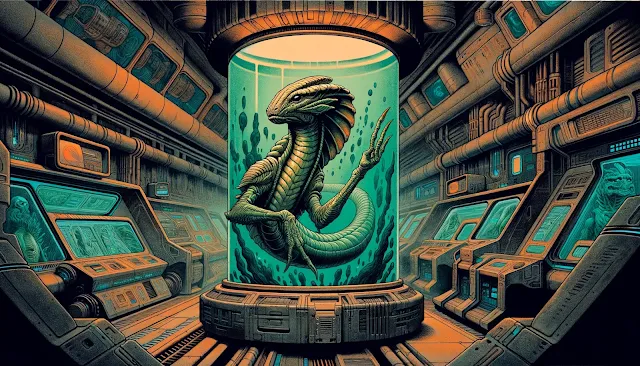Here are the key discussion points and clues that suggest what is truly happening to Teddy Daniels throughout the film:Opening Scene and Initial Arrival
Disorientation and Sickness: Teddy experiences seasickness on the ferry to the island, which can be interpreted as a metaphor for his mental disorientation and the unsettling journey into his own psyche.
Missing Partner Details: Teddy’s new partner, Chuck, fumbles with his gun—a strange mistake for a U.S. Marshal, suggesting he might not be what he seems.
The Investigation begins in earnest
Patients' Reactions and Warnings: During Teddy's interactions with patients, one writes him a note saying, "RUN." This could be seen as an instinctive warning from within the hospital environment about his true situation.
Dreams and Hallucinations: Teddy has vivid dreams of his deceased wife, Dolores, who warns him about the island and its dangers, as well as visions of his liberation experiences at Dachau, which may symbolize his own mental imprisonment.
What about the nurse who drinks an imaginary glass of water?
There's a now-infamous yet subtle & profoundly unsettling scene where a nurse appears to be drinking from an imaginary glass of water.
This moment is brief but serves as a critical clue in the narrative, reinforcing the theme of illusion versus reality that permeates the film. It occurs during one of Teddy Daniels’ investigations around the hospital, as he and his partner Chuck Aule observe the behaviors of the staff and patients.
The action of the nurse pretending to drink from an empty hand is not merely a random inclusion but a deliberate cinematic choice by director Martin Scorsese to sow seeds of doubt about the reliability of Teddy's perception.
It highlights the possibility that not everything Teddy sees or experiences on the island is real. This scene is designed to make the audience question the authenticity of the environment and the interactions within it, much like Teddy should be doing.
Environmental and Behavioral Clues
Restricted Areas and Evasive Responses: Teddy’s access to certain parts of the island and records is consistently blocked, which hints at a controlled environment designed to keep him unaware of his true circumstances.
Behavior of the Staff: The staff, including doctors and guards, often respond to Teddy’s questions with evasion or overt redirection, suggesting they might be manipulating the situation.
Anomalous Treatment by Dr. Cawley: Dr. Cawley, the head psychiatrist, shows an unusual interest in Teddy and often engages him in ways that seem designed to provoke thought or realization rather than provide answers.
Teddy never has a match to light his cigarette: This foreshadows that he is actually a patient as mental patients are not allowed to have matches.
Teddy’s Flashbacks and Hallucinations
Laeddis and Andrew: Teddy's investigation leads him to search for an inmate named Andrew Laeddis, who he believes set the fire that killed his wife. Clues like these suggest Teddy’s merging identities and confusion about his past.
The Lighthouse: As Teddy becomes more focused on the lighthouse as a place holding all answers, it symbolizes his journey towards the truth about himself.
Climactic Revelations
Revelation in the Lighthouse: Teddy learns that he is actually Andrew Laeddis, a patient at the hospital, and the investigation was a role play designed to break through his constructed denial about murdering his manic depressive wife.
Chuck as Dr. Sheehan: In a twist it is revealed that Chuck is actually Dr. Sheehan, Teddy’s psychiatrist, who played along as his partner to help him confront his delusions.
The Final Scene - a second plot twist
Teddy questions whether it is better to live as a monster or die as a good man, suggesting he might be aware of his reality and choosing to deny it, or has perhaps relapsed into his delusion.
After the startling revelations in the lighthouse, where it is disclosed that he is actually Andrew Laeddis, the man responsible for the death of his wife, Teddy is seen sitting on the steps of the hospital with Dr. Sheehan, his psychiatrist posing as Chuck Aule, his partner.
In a moment laden with existential dread and ambiguity, Teddy poses a poignant question:
"Which would be worse—to live as a monster, or to die as a good man?"
This question not only caps the narrative arc but also plunges the audience into the depths of Teddy's conflict between acceptance of his true identity and clinging to his constructed persona.
This line delivered by Teddy reflects a profound level of self-awareness about his situation. It suggests that he may have a lucid understanding of his actions and their consequences, recognizing himself as 'Andrew Laeddis,' the man who tragically killed his wife during a psychotic break. However, the alternative—that he chooses to maintain the 'Teddy Daniels' persona—implies a deliberate rejection of this painful reality in favor of a more palatable, heroic self-image.
This dichotomy raises the question of whether Teddy's sanity has been momentarily restored, allowing him the clarity to evaluate his existence, or if this is merely another layer of his delusion, a constructed scenario where he can redeem himself as the protagonist of his own narrative.
Moreover, the ambiguity of Teddy’s final words serves as a critical reflection on the nature of his mental state. It leaves open the possibility that Teddy, fully aware of the constructed nature of the role-play therapy he underwent, opts to feign relapse to avoid facing the full weight of his crimes and the reality of his permanent residence at Ashecliffe.
This decision could be seen as a final act of defiance or a tragic resignation to his fate, suggesting that he sees more dignity in being remembered as a good man, albeit in a delusional state, rather than living with the guilt and shame of being a 'monster.'
The film closes on this note, with the ambiguity of Teddy's choice resonating with the viewer, echoing the film’s pervasive themes of identity, reality, and madness.

.webp)






